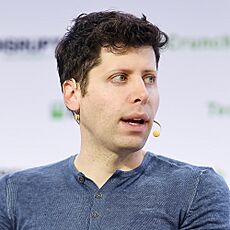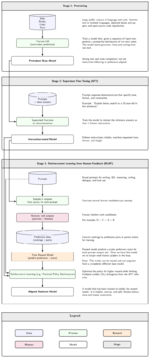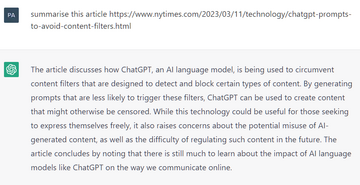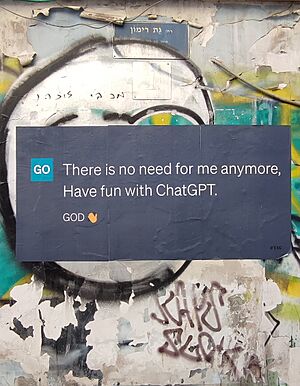ChatGPT facts for kids
 |
|
| Developer(s) | OpenAI |
|---|---|
| Initial release | November 30, 2022 |
| Stable release |
August 7, 2025
|
| Platform | Cloud computing platforms |
| Type |
|
| License | Proprietary service |
ChatGPT is a very smart chatbot created by a company called OpenAI. It was released on November 30, 2022. You can think of it as a computer program you can talk to. It uses a powerful technology called a GPT to understand what you ask and then create human-like text, speech, and even pictures in response.
ChatGPT became super popular very quickly and got a lot of people excited about artificial intelligence (AI). By January 2023, it was the fastest-growing app in history, with over 100 million users. People use it for many things, like answering questions, writing stories, and even helping with computer programming.
While it is a very helpful tool, it's not perfect. Sometimes it can make mistakes or create information that sounds real but is actually made up. Because of this, it has started important conversations about how we use AI safely and responsibly.
Contents
How Was ChatGPT Trained?
ChatGPT learned how to chat from huge amounts of text from the internet, including websites like Wikipedia, books, and software manuals. To make it good at conversations, its creators at OpenAI used a special training process.
Human trainers helped the AI by showing it good examples of conversations. They also rated the AI's answers, telling it which ones were better. This process, like a teacher helping a student, is called "fine-tuning." It helped ChatGPT get better at answering questions and talking in a helpful way.
To make ChatGPT safer, OpenAI also hired people to look for and label harmful or inappropriate content. This helped teach the AI to avoid creating unsafe answers. The workers had the difficult job of reviewing this content to help build the AI's safety system.
What Can ChatGPT Do?
ChatGPT is a chatbot that can do many different things. You can ask it to write a story, a poem, or even help with your homework. It can also write and fix computer code, compose music, translate languages, and summarize long articles. It can even play games like tic-tac-toe or pretend to be a character from a book.
Users talk with ChatGPT by typing prompts, which are just questions or instructions. You can also talk to it using your voice or give it images. Over time, OpenAI has added many new features to make it even more powerful.
Special Features
- Plugins: In 2023, OpenAI added plugins that connect ChatGPT to other apps. This lets it do things like book a table at a restaurant or search for travel deals.
- Searching the Web: A feature called ChatGPT Search allows the AI to look for recent information on the internet. This helps it give more up-to-date answers.
- Making Images: ChatGPT can create new images from scratch based on a text description you give it. For example, you could ask it to create "a picture of an astronaut riding a horse on the moon."
Free vs. Paid Versions
When ChatGPT first came out, it was free for everyone to use. Now, there are still free and paid versions.
- The free version lets you use many of the main features.
- The paid versions, like ChatGPT Plus, give you access to the newest and most powerful models, faster response times, and special features like advanced image creation.
Challenges and Limitations
Even though ChatGPT is very smart, it's not perfect and has some important limitations. It is not a person and does not "think" or "know" things the way humans do.
Getting the Facts Wrong
Sometimes, ChatGPT gives answers that sound correct but are actually wrong or completely made up. This is often called a "hallucination." It's like the AI is guessing when it doesn't know the real answer. Because of this, it's very important to double-check any facts you get from ChatGPT with reliable sources, like books or trusted websites.
Science fiction writer Ted Chiang compared ChatGPT to a blurry photo. It has a lot of the information from the original, but some details are lost or fuzzy. He said that hallucinations are like "compression artifacts," or weird spots that show up in a low-quality picture.
Unfair Answers
The information ChatGPT learned from was created by people, and sometimes people have unfair ideas or biases. These biases can sometimes show up in the AI's answers. For example, if it learned from texts that contained stereotypes, it might repeat those stereotypes. OpenAI works to reduce this, but it's still a challenge for all AI systems.
Jailbreaking
OpenAI has rules to stop ChatGPT from creating unsafe or inappropriate answers. However, some users have found clever ways to trick the AI into breaking its own rules. This is called "jailbreaking." People are constantly finding new ways to get around the safety filters, and OpenAI has to keep updating the system to fix these loopholes.
Different Versions of ChatGPT
ChatGPT has been updated many times since it was first released. Each new version is based on a more powerful "model," which is the "brain" of the AI. Here are some of the most important versions:
| Version | Release Date | Description |
|---|---|---|
| GPT-3.5 | November 2022 | This was the first model used for ChatGPT. It was very impressive and made the chatbot famous. |
| GPT-4 | March 2023 | A much more powerful and creative model that could understand both text and images. It was first available to paid users. |
| GPT-4o | May 2024 | A faster and smarter version that was better at having real-time voice conversations. It was made available to both free and paid users. |
| o1 | September 2024 | A model designed to "think" for longer before answering, which helps it solve more difficult problems in math and science. |
| GPT-5 | August 2025 | The flagship model that replaced previous versions. It is designed to be OpenAI's most capable and safe model yet. |
How People Use ChatGPT
ChatGPT is used in many different areas, from school to science to art.
In School and Learning
Many students use ChatGPT to help with homework, explain difficult topics, or practice for tests. However, schools have different rules about using it. It's important not to copy its answers directly, as that is considered cheating. Teachers want to see your own work and ideas.
In Science and Medicine
Scientists and doctors are exploring ways to use ChatGPT. It can help summarize research papers or even help doctors think about possible diagnoses. But it's not a real doctor, and because it can make mistakes, medical professionals must be very careful when using it.
In Law and Business
Some lawyers and businesses use ChatGPT to help write emails or documents quickly. But this can lead to serious problems if not checked carefully. In one famous case, a lawyer used ChatGPT for a court case, but the AI made up fake legal cases! The lawyer got into big trouble, which shows that people must always check the AI's work.
For Fun and Creativity
People use ChatGPT for all sorts of creative projects. Some have used it to help write books, create song lyrics, or even design a church service. It's a powerful tool for brainstorming new ideas and creating new things. In 2024, a movie called The Last Screenwriter was released, which was written entirely by ChatGPT.
Safety on the Internet

Like any tool on the internet, ChatGPT can be used in both good and bad ways. Some people have used it to write scam emails or create harmful computer programs. This is why it's important to be careful online and not trust everything you read.
On the other hand, experts are also using AI like ChatGPT to help protect computers from attacks. It can help identify threats and make the internet a safer place for everyone.
Images for kids
See also
 In Spanish: ChatGPT para niños
In Spanish: ChatGPT para niños
- Artificial general intelligence
- Ethics of artificial intelligence
- Intelligent agent
- List of large language models
 | Kyle Baker |
 | Joseph Yoakum |
 | Laura Wheeler Waring |
 | Henry Ossawa Tanner |







